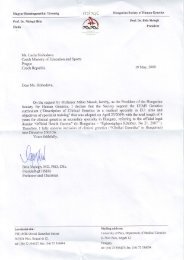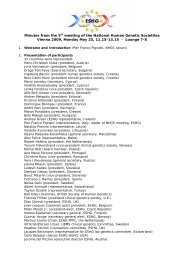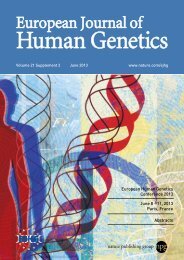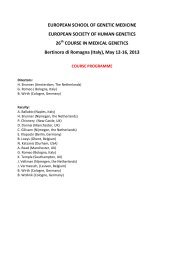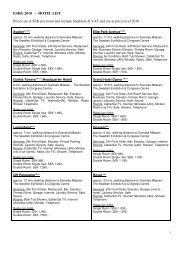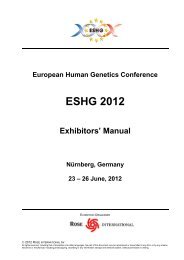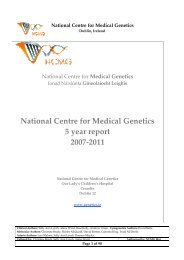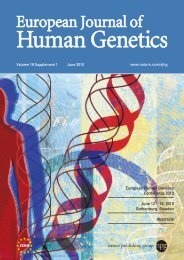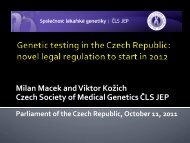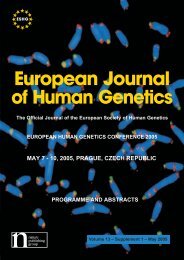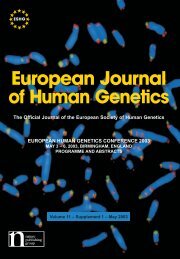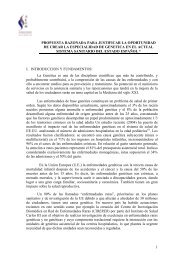2008 Barcelona - European Society of Human Genetics
2008 Barcelona - European Society of Human Genetics
2008 Barcelona - European Society of Human Genetics
Create successful ePaper yourself
Turn your PDF publications into a flip-book with our unique Google optimized e-Paper software.
EMPAG Plenary Lectures<br />
the activity itself .<br />
This presentation draws on material produced by participants during<br />
the development <strong>of</strong> the project and subsequent performances to illustrate<br />
how aspects <strong>of</strong> the methodology used within the project sought<br />
to engage participants and to facilitate their appreciation complexity <strong>of</strong><br />
the issues raised .<br />
EPL2.4<br />
Pr<strong>of</strong>essional ambivalence: accounts <strong>of</strong> ethical practice in<br />
childhood genetic testing<br />
M. A. Arribas-Ayllon, S. Sarangi, A. Clarke;<br />
Cardiff University, Cardiff, United Kingdom.<br />
Childhood genetic testing raises complex ethical and moral dilemmas<br />
for both families and pr<strong>of</strong>essionals . In the family sphere, the role <strong>of</strong><br />
communication is a key aspect in the transmission <strong>of</strong> `genetic responsibility’<br />
between adults and children . In the pr<strong>of</strong>essional sphere, genetic<br />
responsibility is an interactional accomplishment emerging from<br />
competing views over what constitutes the `best interests’ <strong>of</strong> the child .<br />
In the present paper we extend our previous research into parental<br />
accounts <strong>of</strong> childhood genetic testing and explore the ethical explanations/descriptions<br />
<strong>of</strong> pr<strong>of</strong>essionals in research interviews . Interviews<br />
(n=20) were conducted with pr<strong>of</strong>essional practitioners involved in the<br />
genetic diagnosis and management <strong>of</strong> children and their families . We<br />
first identify four inter-related themes - juxtaposition <strong>of</strong> parental rights<br />
vis-à-vis child’s autonomy, elicitation <strong>of</strong> the child’s autonomy, avoidance<br />
<strong>of</strong> parental responsibility and acknowledgement <strong>of</strong> uncertainty<br />
- and then, using Rhetorical Discourse Analysis, examine the range <strong>of</strong><br />
devices through which ethical explanations are situationally illustrated:<br />
contrast, reported speech, constructed dialogue, character and event<br />
work . An important device for facilitating ethical explanations is the use<br />
<strong>of</strong> extreme case scenarios which reconstructs dilemmas as justifications<br />
<strong>of</strong> pr<strong>of</strong>essional conduct . Our analysis <strong>of</strong> pr<strong>of</strong>essional accounts<br />
suggests that ethical practice is not a simple matter <strong>of</strong> implementing<br />
principles but managing the practical consequences <strong>of</strong> interactions<br />
with parents and children . We conclude that more attention is needed<br />
to understand the way pr<strong>of</strong>essional practitioners construct and share<br />
cases as useful illustrations <strong>of</strong> evidence-based ethical practice .<br />
EPL3.1<br />
Patients’ attitudes to the use <strong>of</strong> preimplantation genetic<br />
diagnosis for inherited predispositions to bowel cancer<br />
A. A. D. Melville, H. E. Musgrave, T. Clancy;<br />
Medical <strong>Genetics</strong> Research Group and Regional <strong>Genetics</strong> Service, University<br />
<strong>of</strong> Manchester and CMMC NHS Trust, Manchester, United Kingdom.<br />
Familial Adenomatous Polyposis (FAP) and Hereditary Non-Polyposis<br />
Colorectal Cancer (HNPCC) are dominantly inherited cancer predisposition<br />
syndromes which confer a significantly increased risk <strong>of</strong><br />
bowel and other cancers . The <strong>Human</strong> Fertilisation and Embryology<br />
Authority (HFEA) have approved preimplantation genetic diagnosis<br />
(PGD) for FAP and HNPCC in the UK . Semi-structured telephone<br />
interviews were used to explore the views <strong>of</strong> 6 FAP and 8 HNPCC<br />
mutation carriers (6 men and 8 women) regarding the use <strong>of</strong> PGD for<br />
their condition and other scenarios . The general acceptability <strong>of</strong> the<br />
use <strong>of</strong> PGD depended on the perceived severity <strong>of</strong> the condition in<br />
question and views about the moral status <strong>of</strong> the embryo/foetus during<br />
development . While both patient groups perceived FAP or HNPCC to<br />
have a low impact on quality <strong>of</strong> life, approximately half <strong>of</strong> the participants<br />
accepted the use <strong>of</strong> PGD for their condition in principle . Fewer<br />
participants however, from both the FAP and HNPCC groups, would<br />
consider personally using PGD for their condition . The importance <strong>of</strong><br />
individual choice around reproductive decision-making was a central<br />
theme although there were concerns about the expansion <strong>of</strong> PGD into<br />
non-medical trait selection . The main advantage <strong>of</strong> PGD was seen to<br />
be avoiding termination <strong>of</strong> pregnancy. Disadvantages identified included<br />
the emotional and financial costs <strong>of</strong> undergoing the procedure, and<br />
the relatively low chance <strong>of</strong> a successful pregnancy .<br />
EPL3.2<br />
Pre-implantation genetic diagnosis (PGD) and prenatal<br />
diagnosis (PND) for cancer predisposition syndromes: reported<br />
practices and attitudes <strong>of</strong> French pr<strong>of</strong>essionals<br />
C. M. Julian-Reynier 1,2 , F. Chabal 3 , F. Nowak 4 , T. Frebourg 5 , D. Lemery 6 , C.<br />
Noguès 7 , F. Puech 8 , F. Thepot 9 , D. Stoppa-Lyonnet 10 ;<br />
1 INSERM (UMR912), Marseille, France, 2 Institut Paoli-Calmettes, Marseille,<br />
France, 3 UMR912 INSERM, Marseille, France, 4 Institut National du Cancer, Paris,<br />
France, 5 University Hospital, Rouen, France, 6 University Hospital, Clermont-<br />
Ferrand, France, 7 Regional Cancer Centre, Saint-Cloud, France, 8 University<br />
Hospital (Jeanne de Flandre Hospital), Lille, France, 9 Agence de Biomédecine,<br />
Paris, France, 10 Institut Curie, Paris, France.<br />
PGD and terminations <strong>of</strong> pregnancy for foetal indications are registered<br />
in France but the spontaneous demand experienced by medical<br />
pr<strong>of</strong>essionals in their practice is unknown .<br />
Objectives : to describe the reported demand and acceptability <strong>of</strong><br />
PGD/PND for cancer predisposition syndromes such as observed by<br />
cancer geneticists and prenatal diagnosis centres .<br />
Methods: Mail/postal survey (self-administered questionnaires) among<br />
all French cancer geneticists (N=123) and multi-disciplinary prenatal<br />
diagnosis (MPD) teams (N=47) registered by the French regulatory<br />
biomedicine agency .<br />
Results: Cancer geneticists (47 y .o , SD=8) and MPD team coordinators<br />
(55 y .o, SD=7) answered in 62% and 64% <strong>of</strong> the cases, respectively<br />
. Half the cancer geneticists reported a spontaneous demand<br />
from their consultees during the preceding year (50% for PGD, 59%<br />
for PND) . The issue <strong>of</strong> PGD, had been raised for the same pathologies<br />
as for PND but less frequently . PND was discussed for Familial Adenomatosis<br />
Polyposis (n=57), Retinoblastoma (n=45), NEM1 (n=34),<br />
Breast-Ovarian Cancer (n=20) and Li-Fraumeni syndrome (n=8) . MPD<br />
teams only reported 6 requests for PGD (5 for FAP; 1 for BRCA1) .<br />
When cancers are likely to occur during early childhood with high<br />
penetrance, high severity and no effective prevention/treatment, the<br />
acceptability <strong>of</strong> PGD/PND was very high (>80%) . When cancers are<br />
likely to occur before 50 y .o . but never in childhood and that an effective<br />
non deleterious prevention/treatment is available, the acceptability<br />
<strong>of</strong> both interventions was low but much higher for PGD (40%) than for<br />
PND (30 y,and those affected by<br />
cancer,or having children,or probands reported that knowing if their<br />
children were at risk was the main reason to undergo genetic testing<br />
(p> 0 .001 in all cases),while individuals



